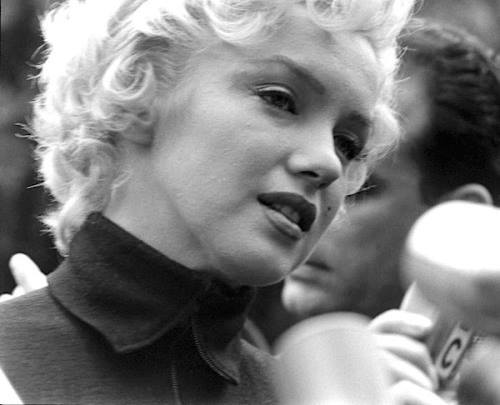
As reported by ES Updates earlier this year, Alistair Cooke at the Movies – an anthology of the eminent British journalist’s writings on Hollywood – is now available via Kindle as well as in print. The book includes two full pieces about Marilyn, and several other references. You can read Cooke’s obituary of Marilyn here.
Cooke’s first thoughts on Marilyn were broadcast on October 14, 1954, on his weekly BBC radio show, Letter From America, regarding her divorce from Joe DiMaggio.
“The Monroe-DiMaggio breakdown is easily dismissed as just another Hollywood marriage. It’s true enough that over twenty, thirty years Hollywood has developed certain mores and customs. And the world jumps to the conclusion that love and marriage in Hollywood constitute something like a religious heresy, a shameless cult mocking the true faith of marriage and children. I have no hesitation in saying that this is mostly moonshine and is brewed from a compound of ignorance and envy…
The gods and goddesses of the Greeks were not known much outside the Mediterranean, and were never seen in the flesh. But the mere announcement of Marilyn Monroe arriving on platform five would cause a riot anywhere in the world. She was mobbed on arriving in Tokyo last year more embarrassingly than she was on leaving San Francisco…
I don’t think there’s been so much talk, from the unlikeliest people, about a movie marriage since the Pickford-Fairbanks idyll as there has been the last fortnight about Marilyn Monroe and Joe DiMaggio. I hope I can get across to you that this marriage, when it suddenly burst upon the world – an elopement naturally – nine months ago, was equally a poetic event … She was a poor girl, an orphan, brought up in an orphanage, and towards the end of the war she was a war-factory worker – a tousled, cheerful, lonely working girl, pretty as a kitten. It is not hard for millions of such girls to identify with her.
So who did Rosie the Riveter marry? She eloped with one of the two or three greatest baseball players there ever have been; nobody but the Yankee Clipper himself … he met Miss Monroe over a plate of spaghetti on a blind date. And they eloped. The perfect fulfilment of two ambitions: the average American boy’s dream of being a baseball hero, and the girl next door’s dream of Hollywood.
So they moved down to Hollywood, and to Joe ‘down’ is the word, not only from his beloved San Francisco, but from any sort of life that made sense to him. He was suddenly surrounded by voice coaches and dancing teachers, and press agents, and telephone calls for publicity stills, for magazine covers, for calendars, for interviews … And the object of all this concern was a wife who worked hard in a calling where you go to bed at nine and get up for work at five in the morning. It was all hopelessly bewildering, and one day Miss Monroe announces, right upstairs, over your puzzled head, that she is going to file for divorce…
I tell you this story in its social outline and leave you to write your own moral. But don’t ascribe it to Hollywood, whose divorce rate is hardly higher than that of Bradford or Kensington. Put it down in an age of television, aeroplanes, publicity and universal movies to the overwhelming conspiracy of fame against two ordinary and engaging young people who pay a rather high price for the only extraordinary thing about them – her prettiness, and his old knack of hitting a ball into the grandstand.”